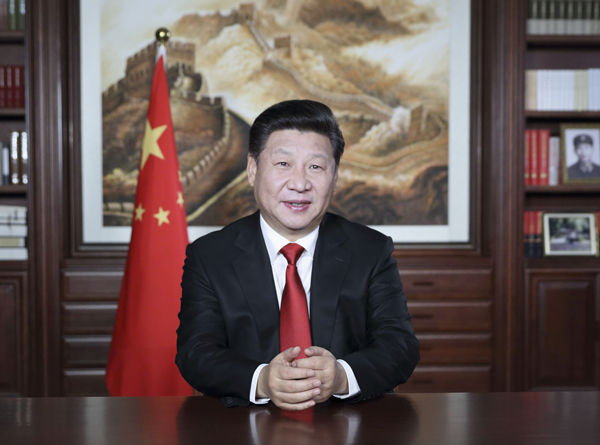BEIJING, Dec. 31 (Xinhua) — Several laws and regulations will take effect in 2016, and change the day-to-day lives of the Chinese people.
From allowing a second child and making it easier for migrant workers to settle down in big cities, to measures that make the stock market more stable and market-oriented, these new rules touch on the deeper problems facing the Chinese and will go down in history.
A FAMILY AFFAIR
From the first day of 2016 the lives of tens of millions of Chinese couples will change when the amended family planning law takes effect,allowing all couples to have two children.
This historic move is part of efforts to balance the population structure.
Chen Li, who works at a public institute in northwest China’s Shaanxi Province, has always wanted a second child.
“Thanks to the amended law, my husband and I can plan for another child. My daughter will have a younger sibling, and they can take care of each other,” said Chen, who is in her forties.
China’s family planning policy was first introduced in the 1970s to rein in the surging population. For decades, most urban couples were limited to one child, while rural couples were allowed to have two children if the first was a girl.
The policy gradually relaxed as a number of social problems arose. In 2013, China began to allow couples to have a second child if either parent was an only child.
Guo Zhigang, a sociologist with Peking University, said around 35 percent of the population will be over 60 by 2050. “The new law will help balance the decreasing labor force and aging population,” he added.
CITY LIFE
The new year also brings good news for the 250 million migrant workers in cities, mainly from rural areas. They will be able to apply for residence permits that will give them better access to local public services from Jan. 1.
According to the new regulation, applicants must have lived in the city in which they are applying for residency for at least six months and either have a stable job, stable place to live or be studying.
Those granted the new residence permits will gain access to more basic public services, including nine years of compulsory education for children and basic health care. The new permits will also bring conveniences such as passport issuance and automobile registration.
“For decades, migrants have experienced inconveniences in places they work and live in because they are not locals,” said Wang Han, 31, a software engineer in Beijing. Wang came to Beijing in 2006 from the northeast province of Jilin.
Although Beijing has issued residence permits since 2003 for migrants who have made extraordinary contributions or those who are classified as urgently needed talent, Wang found it difficult to get one. “The regulation will ensure migrants have more equal access to social services received by local ‘hukou’ holders,” said Wang. In China, people with a city’s “hukou” enjoy better educational opportunities, employment support and social welfare.
A STABLE MARKET
China will introduce a circuit breaker next year in addition to the existing daily trading limit for individual stocks to ward off major swings in the country’s stock market.
Market gyrations during the summer this year ended a bull-run of Chinese stocks since late 2014 and wiped out trillions in market value.
The circuit breaker will force trading at exchanges in Shanghai and Shenzhen to suspend for 15 minutes if the Hushen 300 index falls five percent. Trading will halt for the rest of the day if the index plunges more than seven percent.
There were 25 days when the index fell over five percent between the beginning of 2014 and the end of October this year, including 11 days when the decline exceeded 7 percent, data compiled by Ping An Securities shows.
Meanwhile, new stock offerings on the domestic market will see less bureaucratic meddling as registration-based IPO rules will replace the approval-based listing process. The supply of new stocks will gradually increase and more companies can access fundraising through the stock market under more flexible listing requirements.
Under the registration-based IPO rules, regulators will only need to ensure thorough information disclosure for IPOs and let the market determine the value of new stocks rather than hand-pick companies for listing, a practice that has bred corruption among officials who get to decide on which company goes to market.
IT’S EASY TO BE GREEN
A new law on air pollution control will become effective on the first day of 2016. This new legislation was amended and passed this year amid worsening air pollution across China.
Beijing and its surrounding region in northern China were among the regions worst hit by smog containing hazardous air-borne particles measuring less than 2.5 microns in diameter, known commonly as PM 2.5.
China has made similar legislation in the past, but existing regulation has been seen as increasingly outdated and less effective in reducing pollution.
The new law metes out tougher punishments to industries and seeks to curb air pollution at its root.
In the past, companies and organizations that failed to comply with legal requirements on air pollution faced fines of up to 500,000 yuan (around 80,600 U.S. dollars). That limit is gone in the new law, in the hope that reckless polluters will no longer be able to afford to pollute.
The new law also mandates that gasoline be produced at a higher quality and alternative energy used to reduce coal consumption.
Local governments will also be assessed and monitored over what they do to improve air quality. They have largely ignored environmental protection in the past in their growth-at-all-cost approach to economic development. Enditem


































































































